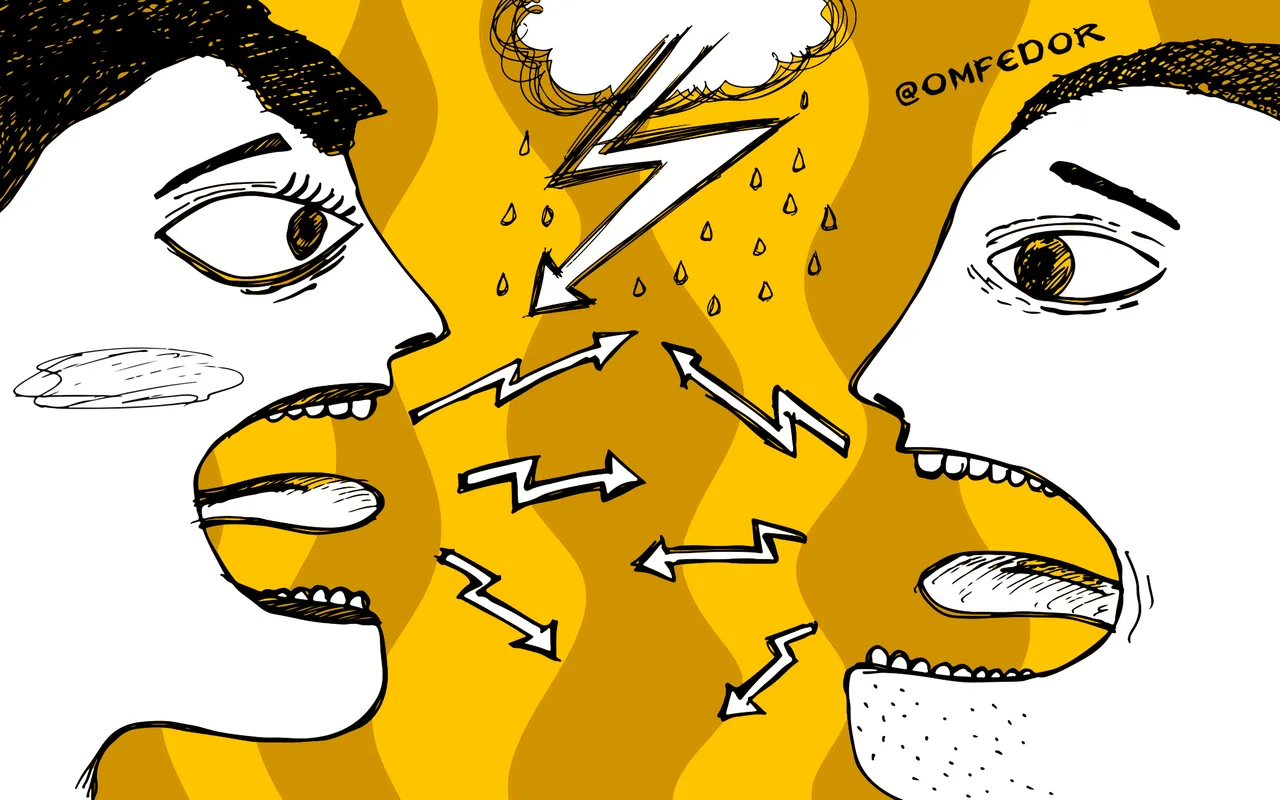

One day, when I lived in the monastery, I had a big fight with my best friend. The quarrel occurred over nothing. We were given new clothes and he didn't get his set. At some point he took my clothes from my locker without asking for my permission. I did not like it at all, but I did not say a thing or express my anger in any way. However, the hostility and tension between us began to grow.

At some point I got sick and they moved me to a private room. I almost did not participate in the monastery’s life due to my illness: did not attend services, nor help the monks in cleaning the temple or any other utility works. We saw each other less, however, we never spoke, even when we met. In the end, the real war began. I remember how the hatred filled me. I hated him for his behavior. He hated me. We stopped to talk at all.
One day he came to me and said, "Well, how are you? What’s new?". I started telling him some philosophical stuff, hiding my hatred and resentment behind the words of the Holy Scriptures. He listened to me, but then interrupted and said, "Look, I understand it all, but how do you feel for real? What are your feelings? I'm not interested in all this philosophy. Can you just tell me; how do you feel about me?".
It was a surprise. I asked him: "Are you sure you really want to know this? Are you ready to hear it?". He affirmed, and I told him emotionally everything that had accumulated in me all this time.
However, he did not defend and instead listened to me. Seeing that he is sincere with me and has no intent to fight, I asked him the same question: "What do you feel? What's on your mind?". And he told me everything he felt and how he saw this whole situation.

It was hard to hear the truth. After all, it is very natural to defend yourself, when you're accused of something or when someone points out your flaws. But I didn't do that, because he did not answer to my claims.
Then we began to understand the situation and came to the conclusion that none of us wanted this war. We did not want to quarrel, but each of us at some point decided that the other was attacking, being disposed hostilely and with malicious intent. And that was a mistake and the root of our conflict. We have lost faith in each other and the belief that the other means well.
My wife and I have rules, or rather a certain culture of communication. First of all, we strive to clarify all the obscure moments in our relationship and keep it pure. I call it "relations hygienic." The basic idea is to keep the faith that your partner wants you to be happy and doesn't want to cause you pain and discomfort.
So my main task is to keep the faith that my spouse wishes me well. And even when she hurts me and creates problems, she doesn’t mean it, but rather advertently mistakes. I firmly believe it to be the foundation of a happy and lasting relationship.
My wife has the same task: to keep the faith that I wish her well. Perhaps it seems too simple and childish, but it works. As soon as I or my wife feel any tension or discomfort, we immediately discuss it. We do not allow to form a snowball and start a chain reaction, which forces a slight error turn into a war.
And if any person causes me pain or discomfort, I think that he is doing this by mistake, not on purpose.
I love to explain this by the following example. Imagine that someone stepped on your foot and you feel pain.
The first thing you need to do is endure the pain and not react. That is not to rush at him with shouts and accusations, trying to step on his foot in response.

Then all you need to do is tell him how you feel about the pain he caused. Roughly speaking to say: "Dear friend, I believe you wish me well and treat me friendly, but it seems that you accidentally stepped on my foot and it hurts me so much". I’m, of course, exaggerating and do not urge anyone to use this exact phrase. But in this formula I reflect the message and the content you should generate within.
And the third step is to let the individual detect his mistake and apologize to you, that is very important in such situations, as apology is the proof that he hurt you accidentally, unconsciously, by mistake.
That's all. This is the formula that allows you to keep the relationship clean. You just should not accumulate grievances and claims against each other.
There is no place for grievances and complaints in successful relationship. I sometimes hear someone bragging that they have been together for 15 or 20 years. And this implies that I have to wonder and admire such a long-lasting relationship. However, the measure of a good relationship is different for me. I don't care how many years they are together. I care how free are their relations from grievances and complaints to each other. I do not think that relationship is an example to follow nor a reason for pride, if the partners have accumulated mutual claims.
That’s all, nothing more. If a person cares for you, respects and loves you, if he is really friendly, he will apologize and try to correct the error. If the person does not care about your feelings, it is better to stay away. That is, if someone deliberately hurts you, then he's just an aggressor, and you really must protect yourself from him.
It’s very important to avoid labeling the other as an enemy and deciding ahead that a person wants to harm you. The main thing is not to lose faith in a friend, partner, husband or wife.
After all, we all make mistakes, which affect our loved ones and make them suffer. To err is normal. But it is utter important to talk with each other in order to keep mistakes from destroying relationship. And those conversations should be about each one’s feelings in a given situation rather than about philosophy (although it is also worth talking about).

[Drawings © Fedor Chishchin (@omfedor) | 2016 | for this Steemit post]